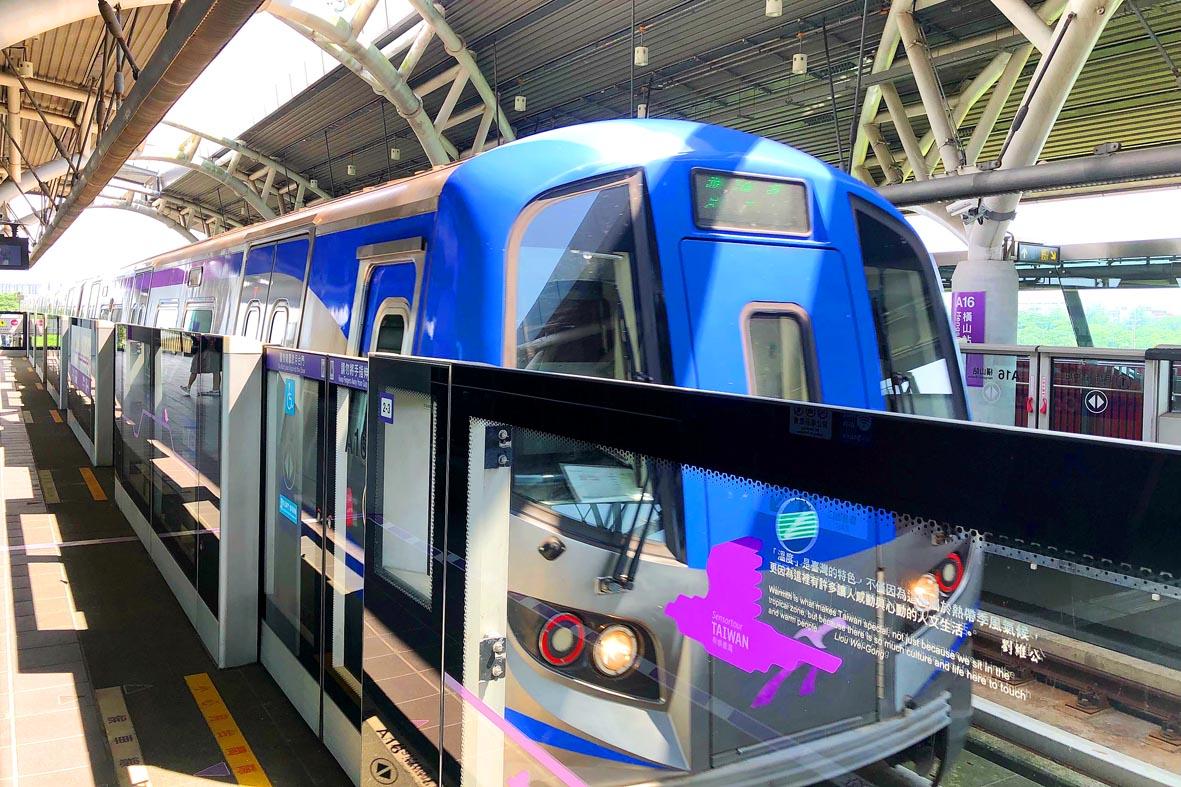Given the huge drop in the number of people using the Taiwan Taoyuan International Airport Access MRT this month amid travel restrictions triggered by the COVID-19 pandemic, Taoyuan Metro Corp yesterday said it would adjust the schedules of its express trains next month.
The number of passengers headed to Taiwan Taoyuan International Airport has dropped by about 50 percent since the beginning of this month, although the number of commuters using the system has not varied as much, it said.
Given that the average passenger volume for the express service has decreased by 60 to 80 percent, it would extend the interval between trains during off-peak hours from 15 minutes to 30 minutes, it said.

Photo: CNA
“After a careful assessment, we feel the need to adjust express train services for practical purposes, so from April 6 to June 14, express trains would be dispatched every 30 minutes during off-peak hours,” the company said.
Peak hours are weekdays from 6am to 9am and from 5pm to 7pm, and express trains would continue to run every 15 minutes during these times, it said.
Off-peak hours are from 9am to 5pm and 7pm to 10pm during the week, it said, adding that the express service would end at 10pm.
On weekends and holidays, express service would be available every 30 minutes from 6am to 10pm.
Regular trains, which stop at every station along the Airport MRT system, would still run at 15-minute intervals, it added.
The change to the express service would help it save on electricity and personnel costs and increase the efficiency of its maintenance work, and would not disrupt commuter travel or the transport of luggage for passengers who used the in-town check-in service, it said.

The Coast Guard Administration (CGA) and Chunghwa Telecom yesterday confirmed that an international undersea cable near Keelung Harbor had been cut by a Chinese ship, the Shunxin-39, a freighter registered in Cameroon. Chunghwa Telecom said the cable had its own backup equipment, and the incident would not affect telecommunications within Taiwan. The CGA said it dispatched a ship under its first fleet after receiving word of the incident and located the Shunxin-39 7 nautical miles (13km) north of Yehliu (野柳) at about 4:40pm on Friday. The CGA demanded that the Shunxin-39 return to seas closer to Keelung Harbor for investigation over the

National Kaohsiung University of Science and Technology (NKUST) yesterday promised it would increase oversight of use of Chinese in course materials, following a social media outcry over instances of simplified Chinese characters being used, including in a final exam. People on Threads wrote that simplified Chinese characters were used on a final exam and in a textbook for a translation course at the university, while the business card of a professor bore the words: “Taiwan Province, China.” Photographs of the exam, the textbook and the business card were posted with the comments. NKUST said that other members of the faculty did not see

The Taipei City Government yesterday said contractors organizing its New Year’s Eve celebrations would be held responsible after a jumbo screen played a Beijing-ran television channel near the event’s end. An image showing China Central Television (CCTV) Channel 3 being displayed was posted on the social media platform Threads, sparking an outcry on the Internet over Beijing’s alleged political infiltration of the municipal government. A Taipei Department of Information and Tourism spokesman said event workers had made a “grave mistake” and that the Television Broadcasts Satellite (TVBS) group had the contract to operate the screens. The city would apply contractual penalties on TVBS

A new board game set against the backdrop of armed conflict around Taiwan is to be released next month, amid renewed threats from Beijing, inviting players to participate in an imaginary Chinese invasion 20 years from now. China has ramped up military activity close to Taiwan in the past few years, including massing naval forces around the nation. The game, titled 2045, tasks players with navigating the troubles of war using colorful action cards and role-playing as characters involved in operations 10 days before a fictional Chinese invasion of Taiwan. That includes members of the armed forces, Chinese sleeper agents and pro-China politicians